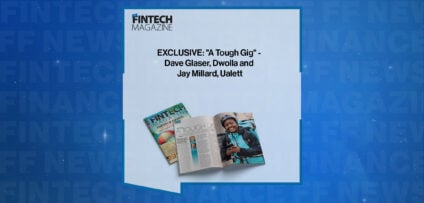Breaking News

EXCLUSIVE: “Answering the Call” – Nkosi Moyo, Crown Agents Bank in ‘The Fintech Magazine’
Crown Agents Bank is one of the few operating in the challenging environment of overseas cash aid, delivering billions of dollars every year directly into people’s hands. We asked Head of Global Payments Mobile Sales, Nkosi Moyo, how it uses technology and data to help
When disaster strikes in countries perpetually plagued by challenges like civil conflict, disease and famine, there’s often a crisis of conscience in the well-off West over sending cash to help. There’s a suspicion – backed by evidence in the case of some of the biggest donation events of the last few decades – that it won’t reach the frontline of need, but be diverted to fund arms or pocketed by corrupt officials. Nevertheless, cash is still the most useful form of financial support in a crisis, according to Dr Kate Orkin of Oxford University. Her studies have revealed that cash transfer programmes are the preferred method of government intervention in low and middle-income countries. This, she says, citing reviews by the World Bank and Overseas Development Institute, is because there’s a recognition that, if delivered direct to them, ‘poor people spend cash well’.
“Cash has the added benefit of giving people autonomy to spend on what they need most,” she says, adding: “Emergency, fast cash is a smart investment in long-term poverty alleviation.”
Between 2016 and 2019, the value of cash and voucher assistance doubled from $2.8billion to $5.6billion, making up nearly 18 per cent of all international humanitarian aid, according to the most recent research by the CALP Network, which researches and promotes the use of cash assistance. Cash aid has been proven to stimulate long-term business activity, it gives people dignity and agency over their own lives, and generally leads to a multiplier effect as communities and individuals come together to get the most value from it.But that doesn’t mean that getting it to them is easy.
There are a raft of challenges for non-governmental organisations (NGOs) and charities, and the financial institutions and payment services providers serving them. Not only must they often overcome a lack of rails and connectivity, but factors like corruption, fraud, geographical inaccessibility and political unrest can make the safe passage of both hard cash and electronic payments difficult.
Crown Agents Bank (CAB) is a UK-regulated FX and payments service provider, specialising in global FX and cross-border payments for hard-to-reach markets, using a combination of widespread local networks and technologies suited to each situation.Its head of global payments mobile sales, Nkosi Moyo, says: “One challenge is just getting the funds into the country. The next considerations are ‘what can we do about beneficiaries who are not banked? How do we move funds to a remote village? And how do we make sure beneficiaries being paid are the validated ones and the funds are not being diverted to other uses?’.”
GiveDirectly is just one of the charities it’s worked with to overcome those hurdles. A not-for-profit organisation founded on cash assistance using mobile phone deposits, it has collaborated with CAB to help families living in extreme poverty in African countries, including Kenya and Rwanda.Charities operating in East Africa were struggling to deliver funds to vulnerable communities in rural areas lacking infrastructure and where people often don’t have a bank account, all of which made last-mile funds delivery difficult and reliant on multiple third-party service providers who might not be trustworthy. And each take a cut, of course, meaning less funds reach their destination.
To counter this, GiveDirectly wanted to use mobile transfers to send funds straight to beneficiaries. CAB had acquired the remittance business of mobile payments gateway solution Segovia in 2019 and CAB’s compliance controls as a UK-regulated bank enabled the transfers to happen at scale via that channel.Its mobile and bank payment capabilities cover 100 per cent of GiveDirectly’s markets, saving valuable time, compared to traditional rails.
One example was sending funding into Malawi during the pandemic when, despite transaction volumes exploding from 15,503 pre-COVID to 201,960, CAB bulk transaction technology meant GiveDirectly saw lower costs for transactions ($168,694 USD pre-COVID versus $98,803 USD during COVID) across its East Africa programmes. GiveDirectly was able to use CAB’s technology to open new payment corridors, too, even during lockdown, allowing more funds to reach end beneficiaries at one of the most critical times in the charity’s history. So, how has the bank ended up playing such a vital role in world events?
CAB can trace its roots to the UK not-for-profit international development company Crown Agents, which has worked closely with the British government, other public institutions, individual donors philanthropists and the corporate sector for more than a century. CAB was spun out of Crown Agents as a private company in 1989, but over its long history, it has increasingly specialised in foreign exchange trading. It’s a line of activity that admittedly caused it some difficulties following its initial public offering (IPO) last summer, after a number of changes to the market conditions in some of its key currency corridors triggered a profit warning, four months in.But FX market conditions aside, CAB has achieved huge success, processing £34billion in FX and payments and notching up 56 per cent six-year revenue growth.
That’s a lot of help distributed to a lot of people. According to CEO Bhairav Trivedi, CAB is driven by social impact: to ‘drive financial inclusion, formalise financial markets and strengthen the local economies’. And, following its acquisition by private equity firm Helios in 2015, it began a digital transformation journey to continue delivering on that.CAB collaborated with SoftCo to integrate an end-to-end, procure-to-pay solution, encompassing everything from vendor management to invoice capture, matching, and invoice approval, for more efficient and accurate processing.
In 2020, to better manage risk and improve efficiency, controls and customer experience, with Deloitte and Outsystems it introduced three portals – EMpower Payments, Empower FX and EMpower Pensions – for workflow management, direct customer interactions and administration. Its earlier acquisition of US technology company Segovia, meanwhile, had enabled CAB to extend its payment network, include mobile money and integrate Segovia’s modern payments infrastructure into its already extensive FX capabilities. Moyo heads CAB‘s global payments business, supporting NGOs and large multilateral donor organisations. Much of his focus is on those vital last-mile payments. He explains that CAB aims to minimise the complexities and delays in moving money around higher-risk zones, and across regulatory jurisdictions, through clever use of data.
“We give clients clear guidelines for formatting payments for a particular corridor, and information that should be included, including documentation for certain countries,” he says. This is complemented by CAB’s macro-level insights. “Our business is primarily FX and payments. We cover about 100 countries and currencies. From an FX perspective, we have a sense of what clients are calling us for, when they want to exchange from one currency to another, the deals we are processing, win rate, loss rate, how quickly we can settle and get the funds into whichever account,” says Moyo. “We can also see how many transactions are being held up in screening queues, which can go straight through and which need repair. That helps us understand clients’ challenges in formatting and sending to us, and ensure better quality data.”
The generalised move towards instant cross-border payments is increasing NGOs’ expectations.
“There is an element of instant,” says Moyo. “Some countries can pick up and apply your instructions to a beneficiary’s account. In the mobile money space, too, mobile money operators can receive and make instant payments, enabling us to deliver value to a beneficiary’s wallet within 10 seconds. “Some local payment infrastructures have yet to be upgraded to support instant payments, but payments will get faster as countries tackle this, and transaction costs should come down.“We’re also interested in the role digital currencies may play, especially central bank digital currencies. Some clients are showing an interest in stablecoins for moving funds from A to B, and we find this interesting in terms of cross-border micropayments.
“The development sector is keen to see banks support finding more efficient solutions for getting value to beneficiaries in remote parts of the world that don’t have access to banking services. Mobile money addresses some of the challenges but some beneficiaries don’t have mobile phones. “We have to be constantly looking at what’s out there in the market – areas like offline card solutions – and what smart partnerships we can get into, to enable better services for our clients.
This article was published in The Fintech Magazine Issue 31, Page 23-24
People In This Post
Companies In This Post
- Bluefin and Basis Theory Partner to Enable Unified Tokenization Across Digital and In-Person Payments Read more
- Invest Bank and AUTON8 Build Partnership to Drive Digital Resilience and Banking Agility Read more
- ING’s AI Roadmap: Platform, People, and Agentic AI Read more
- UK-fintech Provided Over £17.5m in Emergency Wage Advances to More Than 55,000 Employees in the Last Year Read more
- TreviPay Announces AI-Powered Growth Center to Help Enterprises Predict Buyer Behavior and Drive B2B Sales Read more


















